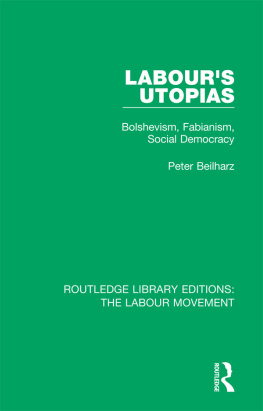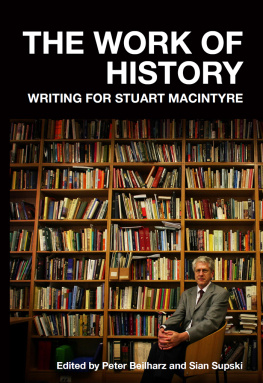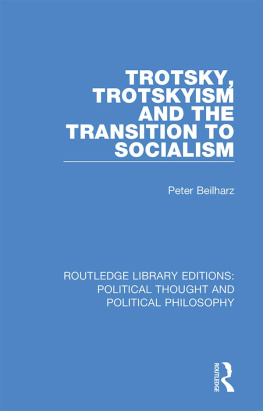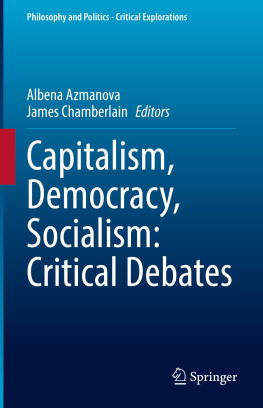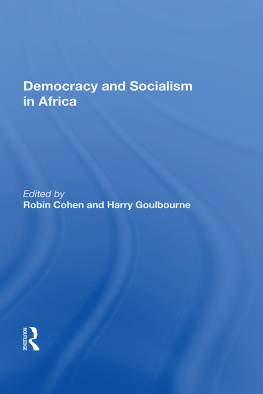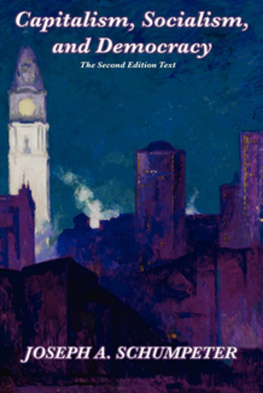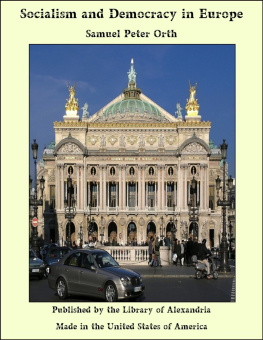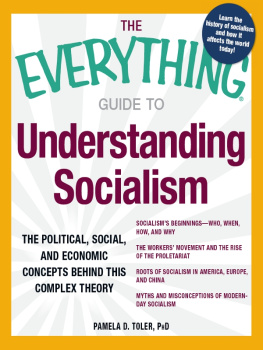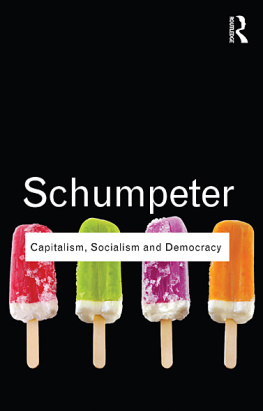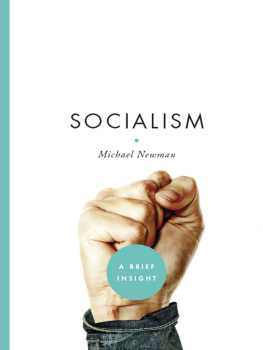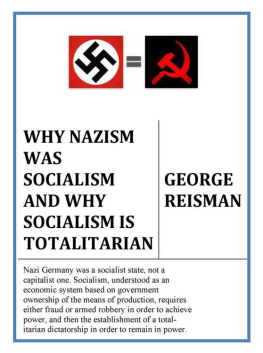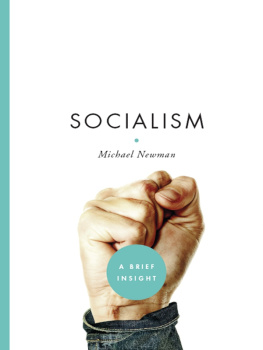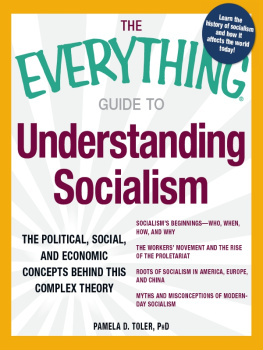ROUTLEDGE LIBRARY EDITIONS:
THE LABOUR MOVEMENT
Volume 2
LABOURS UTOPIAS
LABOURS UTOPIAS
Bolshevism, Fabianism,
Social Democracy
PETER BEILHARZ
First published in 1992 by Routledge
This edition first published in 2019
by Routledge
2 Park Square, Milton Park, Abingdon, Oxon OX14 4RN
and by Routledge
711 Third Avenue, New York, NY 10017
Routledge is an imprint of the Taylor & Francis Group, an informa business
1992 Peter Beilharz
All rights reserved. No part of this book may be reprinted or reproduced or utilised in any form or by any electronic, mechanical, or other means, now known or hereafter invented, including photocopying and recording, or in any information storage or retrieval system, without permission in writing from the publishers.
Trademark notice: Product or corporate names may be trademarks or registered trademarks, and are used only for identification and explanation without intent to infringe.
British Library Cataloguing in Publication Data
A catalogue record for this book is available from the British Library
ISBN: 9781138324350 (Set)
ISBN: 9780429434433 (Set) (ebk)
ISBN: 9781138324619 (Volume 2) (hbk)
ISBN: 9780429450761 (Volume 2) (ebk)
Publishers Note
The publisher has gone to great lengths to ensure the quality of this reprint but points out that some imperfections in the original copies may be apparent.
Disclaimer
The publisher has made every effort to trace copyright holders and would welcome correspondence from those they have been unable to trace.
Labours Utopias
Bolshevism, Fabianism,
Social Democracy
Peter Beilharz
Contents
First published 1992
by Routledge
11 New Fetter Lane, London EC4P 4EE
Simultaneously published in the USA and Canada
by Routledge
a division of Routledge, Chapman and Hall, Inc.
29 West 35th Street, New York, NY 10001
1992 Peter Beilharz
Printed and bound in Great Britain by Biddies Ltd, Guildford and Kings Lynn.
All rights reserved. No part of this book may be reprinted or reproduced or utilized in any form or by any electronic, mechanical, or other means, now known or hereafter invented, including photocopying and recording, or in any information storage or retrieval system, without permission in writing from the publishers.
British Library Cataloguing in Publication Data
Beilharz, Peter
Labours utopias: Bolshevism, Fabianism, Social Democracy.
1. Socialism, history
I. Title
335.009
ISBN 0415066166
Library of Congress Cataloging in Publication Data
Beilharz, Peter
Labours utopias: Bolshevism, Fabianism, Social Democracy/Peter Beilharz
p. cm.
Includes bibliographical references and index.
ISBN 0415066166
1. Socialism. 2. Utopias. 3. Socialism Soviet Union History.
4. Socialism Great Britain History. 5. Socialism Germany
History. I. Title.
HX44.B3726 1991
In 1987 I published my first book, Trotsky, Trotskyism and the Transition to Socialism. By the time of its appearance before then I had come to the conclusion that my generation had expended enough energy in the critique of the revolutionary tradition; the time had come to turn attention to reformism, not least of all given its political centrality. At that time I took leave of the Department of Sociology and Politics at Phillip Institute in order to take up a research fellowship in the School of History at the University of Melbourne. My project at Melbourne was to be entitled Bolshevism and Reformism. The intention was to spend a few weeks, perhaps a month surveying other national traditions in order to understand the differentia specifica of reformism before dedicating the bulk of my time to the analysis of Australian labourism. This book is the pretext which turned into a text, as it became clear to me that clarifying the problems of central traditions such as Bolshevism, Fabianism and Social Democracy constituted a major project in its own right. Of the many people I need to thank, then, first of all I should thank my colleagues at Phillip and at Melbourne, without whom the project would not have been possible. Two individuals warrant special mention Stuart Macintyre and Ian Britain, both world leaders in their fields, which I was trying to straddle. In 1988 I left Melbourne to take up my present position teaching social theory in the Department of Sociology at La Trobe University. Again, my colleagues and students here have proved invaluable. The La Trobe School of Social Sciences funded research conducted at Amsterdam, London and Oxford. The staff at the International Institute for Social History were especially helpful; my special thanks to Mieke Yzermans and Kies Roedinger. I used the Passfield Papers at the London School of Economics thanks to Dr Angela Raspin, and consulted the Fabian and Cole Papers at Nuffield thanks to Mrs Eleanor Vallis. The letters of Bernard Shaw are quoted thanks to the Society of Authors on behalf of the Bernard Shaw Estate.
In Amsterdam I enjoyed the help and friendship of Guglielmo Carchedi, and in London, of Michle Barrett. Paul Hirst was enormously helpful with materials and advice, as was Wolfgang Lubitz in Berlin, and Michael Taveira in Melbourne. Agnes Heller and Ferenc Fehr consistently offered advice and encouragement, as have my close friends in and around Thesis Eleven. Many others offered abundant advice, critical comments and help Alan McBriar, Jos Harris, Trevor Hogan, Terry Irving, Ian Britain, Stuart Macintyre, Roger Fletcher and Johann P. Arnason. Julian Triado and Peter Murphy have taught me more than they know. Peter Sowden at Routledge (ne Croom Helm) has consistently done the things that model editors do, in the most friendly of ways, as has Sue Joshua. The manuscript was typed with more patience and tolerance than I have a right to expect, by Therese Lennox, Glenis Massey, Beth Robertson, and Elaine Young. I am very grateful for their unflinching support. Finally, Lindsey Brake performed a superb job as copy-editor.
For a very long time it has been my blessing to love, and to be loved, by Dor. Our children Nikolai and Rhea, actual doodlers on drafts, aspirant illustrators of manuscripts have always helped to keep us smiling. Finally, as I have grown older, I have come more fully to understand Goethes words, Was Du erlebt von Deinen Vtern hast, erwirb es, um es zu besitzen. I have had the good fortune to be well taught. I dedicate this book to my teachers N. W. Saffin, Colin Duncan, Zawar Hanfi, and Alastair Davidson. Saffin bid me read Bellamy when I was seventeen; it was an experience from which I have never looked back. Duncan taught me about ethics and about morality. Hanfi taught me to read Marx and Weber, and helped me to re-engage my own native tradition. Davidson introduced me to Gramsci, still the most inspiring of Marxists, and helped me journey through Trotskyism. Each did much else besides. My teachers are not responsible for the conclusions to which I have come, but without them I could not have set out on this path at all.

